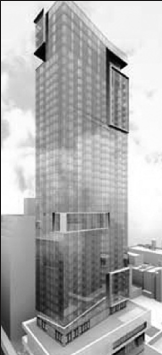By Albert Amateau
The Department of Buildings on Tuesday approved the plans and the application for a building permit for Donald Trump’s proposed 42-story condo-hotel on Spring St. in a manufacturing district in Hudson Square, a project that has roused intense opposition from preservation advocates.
The approval of the application for 242 Spring St. at Varick St. did not yet include the actual permit to continue construction on the site, where the foundation is nearly completed, according to a department spokesperson.
The developer, actually Bayrock/Sapir Organization, with the participation of Trump and his grown children, still had to submit nearly 20 technical documents before a permit could be issued, according to a Department of Buildings statement.
However, the outstanding documents were being submitted on Tuesday afternoon, according to Julius Schwarz, president of the Bayrock Group, who said he was confident he would have the permit in a day or two. Schwarz said he expects the hotel would be ready for occupancy in two years.
Nevertheless, opponents of the project, led by the Greenwich Village Society for Historic Preservation, are considering going to court to overturn the application approval.
“Unfortunately, the city has decided that the interests of billionaire developers trump zoning, protection for our neighborhoods,” said Andrew Berman, executive director of G.V.S.H.P., in a prepared statement issued on April 8.
The project is located in an M1-6 manufacturing zone where hotels are permitted but permanent residential uses are banned. The Trump project, however, is for a condo-hotel with the units owned by individuals who rent them to guests and may not themselves live in them permanently.
While condo-hotels exist elsewhere in the city, the Trump project is the first in a manufacturing zone. Berman and other opponents contend that the hotel designation is just a ruse to avoid the ban on permanent residence. Over the past few months, opponents discovered several advertisements that referred to the project as a residence. But Bayrock insisted that the ads were a mistake and not authorized by the developer.
Bayrock last week signed a voluntary restrictive declaration with the city restricting condo owners or guests from living in their units for more than four months per year. Specifically, the declaration says that occupants may not live in their units for more that 29 days in a 36-day period and for not more than 120 days in a calendar year.
The restrictive declaration also calls for the hotel management to monitor the occupancy of each unit to ensure that the building is really a hotel and not a permanent residence. Computer software must be able to identify when each occupant is about to exceed the limit. The condo-hotel will impose a double daily rate for each day the occupancy is exceeded and one half the amount will be deemed a violation and paid to the city. For repeated violations, the city may require the condo-hotel to hire an independent inspector to conduct an audit and make recommendations that the condo-hotel must follow.
“It took a long time to negotiate that agreement and the city was very diligent, despite our frustration,” said Schwarz, who said he intends to abide by the letter and the spirit of the restrictive declaration.
He added that Trump and his grown children, Donald, Ivanka and Eric, have been active in all aspects of the project. Schwarz said the condo-hotel is an as-of-right use in the location and he intends to complete the foundation and bring cranes to the site immediately.
Berman, however, said, “If you own a condo and are living in it four months of the year, that’s a second home, not a transient hotel. The reality is that many owners will live there, not just for four months, but year-round.” Berman also claimed that previous city rulings have said such units could not be made subject to lease, sale or other arrangement, to which the Trump condo units would be subject.
The project, whose height is equivalent to a 45-story building, is in an area of low-rise lofts and 15-story warehouses and would be the tallest building between Midtown and the Financial District, Berman said.
Berman said he is considering legal action “to force the city to enforce the law and stop the project.”







































